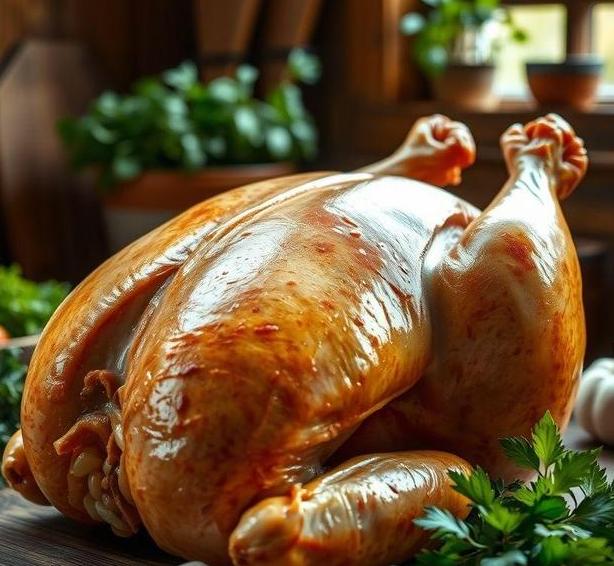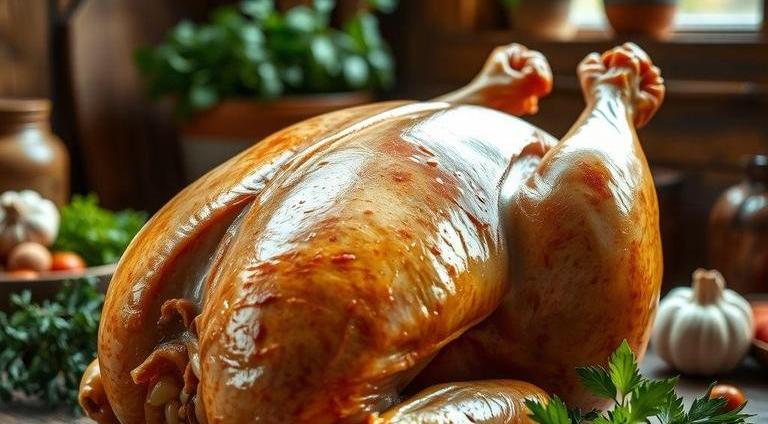When it comes to cooking, chicken is one of the most popular and versatile ingredients that shows up in kitchens worldwide. Whether you’re grilling, baking, frying, or preparing a savory stew, fresh chicken forms the backbone of countless dishes. But here’s the thing – like all perishable foods, fresh chicken doesn’t last forever. It’s essential to know when your chicken is safe to use and when it’s time to let go.
In this guide, we’ll explore all the critical details about fresh chicken, from understanding how long it lasts to knowing how to spot signs of spoilage. We’ll also dive into proper storage techniques and expert tips that will ensure you’re handling your chicken safely and maximizing its freshness. If you’re wondering how to tell when fresh chicken is past its prime or what to do to extend its shelf life, you’re in the right place.
Can Fresh Chicken Go Bad?
Absolutely. Fresh chicken is highly perishable, which means it can spoil quite quickly if not stored properly. The nature of chicken’s moisture content and protein structure makes it an ideal environment for bacteria to grow, especially when exposed to warm temperatures. This is why it’s crucial to handle chicken with care – to prevent foodborne illnesses like Salmonella or Campylobacter.
Unlike some more resilient foods that can last a bit longer at room temperature, chicken begins to deteriorate rapidly when it’s not kept at the right temperature. Even a short period outside of refrigeration or freezing can cause harmful bacteria to multiply, leading to spoilage. The freshness of chicken doesn’t just depend on time, but also on how it’s handled and stored. So yes, fresh chicken can definitely go bad, and it’s important to recognize the signs of spoilage early to avoid any health risks.
Shelf Life For Fresh Chicken

Understanding the shelf life of fresh chicken is key to reducing waste and keeping your meals safe. The shelf life depends on various factors, including whether you’re storing your chicken in the refrigerator or freezing it. Here’s a breakdown:
-
In The Refrigerator
- Raw Chicken: Fresh, raw chicken typically lasts 1-2 days in the refrigerator, provided it’s stored at or below 40°F (4°C). After this point, it’s no longer safe to eat, even if it looks fine.
- Cooked Chicken: Once cooked, chicken can last 3-4 days in the refrigerator. Make sure it’s sealed in an airtight container or wrapped tightly to prevent exposure to bacteria.
-
In The Freezer
- Raw Chicken: If you’re planning on keeping chicken for a longer period, freezing it is the best option. Raw chicken can last for up to 9 months in the freezer, though it’s ideal to use it within 6 months for the best quality.
- Cooked Chicken: Cooked chicken that’s been frozen will stay safe to eat for up to 4 months. However, the quality might degrade if it’s stored longer.
Remember, these are general guidelines, and various factors (like the chicken’s initial freshness when purchased or how it was handled) can influence these timeframes.
Common Signs Of Spoilage
Knowing the common signs of spoilage is crucial. Sometimes, even when chicken looks and smells okay, it could still harbor harmful bacteria. Here are the most common signs that fresh chicken has gone bad:
-
Color Changes
- Fresh chicken should have a pinkish color. If the chicken starts turning gray, greenish, or even yellowish, it’s a strong indication that it’s no longer good.
- The skin might start to look dull or slimy as bacteria proliferate.
-
Off Smell
- One of the quickest ways to tell if chicken has spoiled is by the smell. Fresh chicken has a neutral or slightly faint odor. If it smells sour, rancid, or just “off”, it’s a definite sign that it’s gone bad.
-
Texture Issues
- Fresh chicken should feel firm to the touch, not slimy or sticky. If the chicken feels tacky or slimy, it’s a sign of bacterial growth.
-
Excessive Expiration
- If you’ve kept the chicken in your fridge or freezer for longer than the recommended shelf life (as outlined earlier), it’s time to throw it out. Even if it looks okay, it may still be unsafe to eat.
-
Packaging Integrity
- Check for any tears or holes in the packaging. If the chicken is packaged in a vacuum-sealed bag and the seal is broken, it could indicate that bacteria have entered, accelerating spoilage.
How To Store Fresh Chicken?

Storing chicken properly is vital to prolong its freshness and prevent spoilage. Here are the key methods for storing fresh chicken, whether raw or cooked:
Refrigeration (for Short-term Storage)
- Raw Chicken: Store raw chicken in the coldest part of your fridge (usually the back). Keep it in its original packaging, and if you’ve already opened it, transfer it to a clean, airtight container or resealable bag to avoid contamination.
- Cooked Chicken: Always store cooked chicken in an airtight container or tightly wrapped in plastic wrap or foil. This keeps the chicken from drying out and prevents cross-contamination with other foods.
Freezing (for Long-term Storage)
- Raw Chicken: If you’re not using chicken within 1-2 days, freezing it is the best option. Make sure to place it in a freezer-safe bag or airtight container, and remove as much air as possible to avoid freezer burn. Label the date so you know how long it’s been frozen.
- Cooked Chicken: Cooked chicken can be frozen as well. Portion it into smaller pieces if you plan on reheating it later, and store it in freezer-safe bags or containers. Again, label it with the date for easy reference.
Thawing Frozen Chicken
- Always thaw chicken in the refrigerator, not at room temperature. If you’re in a rush, you can thaw it using the microwave or place it in a sealed plastic bag and submerge it in cold water. Never leave chicken to thaw in warm water or on the counter, as it creates a breeding ground for bacteria.
Expert Tips
Here are some expert tips to help you maximize the shelf life and safety of your fresh chicken:
- Use a Meat Thermometer: If you’re unsure whether your chicken has cooked thoroughly, use a meat thermometer. Chicken should reach an internal temperature of 165°F (74°C) to ensure it’s safe to eat.
- Don’t Rinse Raw Chicken: While you might think rinsing chicken helps clean it, it actually spreads bacteria. The best way to handle raw chicken is to keep it cold and cook it thoroughly.
- Separate Raw from Cooked: Always keep raw chicken separate from cooked chicken and other foods to avoid cross-contamination. Use separate cutting boards, knives, and utensils for raw chicken.
- Check “Sell-By” and “Use-By” Dates: Always pay attention to the sell-by and use-by dates when purchasing fresh chicken. These dates are not just a guideline for freshness but also help you assess how soon it should be used.
- Vacuum Sealing: If you buy chicken in bulk, consider vacuum-sealing it. This removes excess air and can significantly extend the shelf life of both raw and cooked chicken, whether in the fridge or freezer.
FAQs
Can Fresh Chicken Go Bad In The Fridge?
Yes, fresh chicken can go bad in the fridge. It typically lasts 1-2 days if stored properly at or below 40°F (4°C). After this period, harmful bacteria may grow, even in the fridge.
How Long Can Fresh Chicken Stay Out Before It Goes Bad?
Fresh chicken should not be left out at room temperature for more than 2 hours. If the ambient temperature is above 90°F (32°C), this time is reduced to just 1 hour.
How Can I Tell If Fresh Chicken Has Gone Bad?
Signs that fresh chicken has gone bad include a sour or off smell, slimy texture, discoloration (such as gray or green spots), and a sticky surface. If any of these occur, the chicken should be discarded.
Can Fresh Chicken Go Bad In The Freezer?
Fresh chicken can stay good in the freezer for 9-12 months if properly stored in an airtight package. However, the quality may degrade over time, leading to freezer burn or loss of flavor.
Does Cooking Chicken Prevent It From Going Bad?
Cooking chicken helps kill harmful bacteria, but the cooked chicken will still spoil if not stored properly. It should be refrigerated within 2 hours of cooking and consumed within 3-4 days.
What Temperature Should Fresh Chicken Be Stored At?
Fresh chicken should be stored at a temperature of 40°F (4°C) or lower in the refrigerator. For long-term storage, the freezer temperature should be 0°F (-18°C).
Is It Safe To Eat Chicken Past The ’sell By’ Date?
The ’sell by’ date is an indicator of freshness, but it is not a guarantee. If the chicken has been stored properly and shows no signs of spoilage, it may still be safe to eat for a day or two after this date.
Can Fresh Chicken Go Bad If It’s Vacuum Sealed?
Vacuum sealing can help extend the shelf life of fresh chicken by preventing exposure to air. However, the chicken can still go bad over time if not kept at the proper temperature. Even vacuum-sealed chicken has a limited shelf life in the fridge, usually 1-2 days.
Can Fresh Chicken Go Bad If It’s Marinated?
Yes, even marinated chicken can go bad if stored improperly or kept too long. It should be used within 1-2 days of marinating and kept in the refrigerator at all times. Discard if any signs of spoilage, such as bad odor or sliminess, appear.
Can I Eat Chicken That Smells Like Eggs?
No, chicken that smells like eggs or sulfur is likely spoiled and should not be eaten. This smell indicates the presence of harmful bacteria or decomposition and poses a health risk.